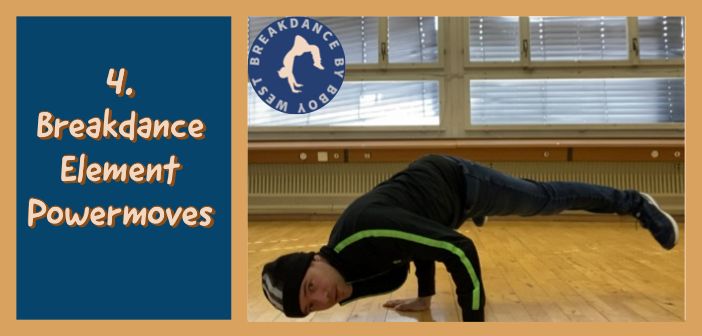(For english version see below)
Bei Powermoves trifft Akrobatik auf Tanz. Bei diesem Element wird eine grosse Kraft sowie hervorragende Technik vorausgesetzt. Die Dreh- oder Rotationsbewegungen erfolgen dabei über die Hände, Ellbogen, Kopf, Rücken oder Schultern, welche bei einer sauberen Ausführung am Ende herausstechen.
Bei den Powermoves wird fast jeder Muskel deines Körpers in Anspruch genommen. Die Trizeps- sowie die Adduktorenmuskeln stechen dabei heraus. Aufgrund der Intensivität ist es in keinem der Elemente so wichtig, wie in diesem sich gut aufzuwärmen und zu dehnen.
Windmill
Die Windmühle gehört zu einem der bekanntesten Powermoves und wurde bereits durch B-Boy Crazy Leg 1978 in einer ersten Form entwickelt (siehe dazu im letzten Blogbeitrag). Die heutige Form sieht anders aus und kann in unzähligen Variationen weiterentwickelt werden. Ich persönlich kenne keinen Move, der so sehr vielseitig ist wie dieser. Den Basic-Powermove siehst du im Tutorial. Als Vorbereitung empfehle ich dir die Stütze aus dem 6. Blogbeitrag.
https://www.youtube.com/watch?v=K_SyVNDhISo
Headspin
Dieser Powermove stammt ebenfalls aus den ersten 10 Jahren der Breakdance-Szene. Dabei drehst du dich auf dem Kopf und kannst ihn durch verschiedene Variationen ausschmücken. Zu Beginn empfehle ich dir, dass du den Kopfstand kannst. Zudem rate ich dir – im Gegensatz zum Tutorial – gleich von Anfang an einen Headspin-Helm zu verwenden. Dies als Schutz deiner Gesundheit.
https://www.youtube.com/watch?v=DO6amOPhp3E
Swipe
Den durch B-Boy Spy (siehe letzter Beitrag) entwickelte Powermove hat es in sich. Eine korrekte Durchführung benötigt ausgezeichnete Körperhaltung, schwungvolle Drehung des Körpers und einen flüssigen Übergang zwischen der Landung auf einem (oder zwei) Bein(en) und dem Übergang zur Drehung. Die Swipes wären schon fast langweilig, wenn es auch dazu keine Variationen gibt. Mehr dazu findest du hier.
https://www.youtube.com/watch?v=RVtjCyoeLB0
Ich hoffe, ich konnte dir mit diesem und den letzten sieben Beiträgen Breakdance näherbringen. In diesem Atemzug möchte ich einen herzlichen Dank an meinen Tanzkollegen Jonas aussprechen, welcher mich tatkräftig bei den Videos unterstützt hat, sowie selbst in den Videos die Hauptrolle inne hat.
Als Abschied haben wir uns eine kleine Combo ausgedacht, bei welcher einige Bewegungen vorkommen, welche in den letzten Beiträgen vorgestellt wurden.
Besten Dank für dein Interesse!
https://www.youtube.com/watch?v=DS_HGuhBR0Q
The ultimate step-by-step guide to the perfect powermove
Powermoves is where acrobatics meets dance. This element requires great strength as well as excellent technique. The turning or rotating movements are done with the hands, elbows, head, back or shoulders, which stand out at the end if executed cleanly.
Power moves use almost every muscle in your body. The triceps as well as the adductor muscles stand out. Because of the intensity, it’s not as important to warm up and stretch well in any of the elements as it is in this one.
Windmill
The windmill is one of the most famous power moves and was already developed by B-Boy Crazy Leg in 1978 in a first form (see about it in the last blog post). Today’s form looks different and can be developed in countless variations. I personally don’t know any move that is as versatile as this one. You can see the basic power move in the tutorial. As preparation I recommend the prop from the 6th blog post.
https://www.youtube.com/watch?v=GG5XmpkQ2r8
Headspin
This powermove also comes from the first 10 years of the breakdance scene. You spin on your head and can decorate it with different variations. At the beginning I recommend you to be able to do the headstand. In addition, I advise you – in contrast to the tutorial – to use a headspin helmet right from the start. This is to protect your health.
https://www.youtube.com/watch?v=ax31qPjm5rQ
Swipe
The power move developed by B-Boy Spy (see last post) has it all. Proper execution requires excellent posture, sweeping body rotation, and a fluid transition between landing on one (or two) leg(s) and transitioning to the swipe. The swipes would be almost boring if there were no variations on them either. You can find more about that here.
https://www.youtube.com/watch?v=pEdtKdoXis4
I hope I could bring breakdance closer to you with this and the last seven posts. In this breath I would like to say a big thank you to my dance colleague Jonas, who actively supported me with the videos, as well as starring in the videos himself.
As a farewell, we came up with a little combo featuring some of the moves that were introduced in the last posts.
Thanks for your interest!
https://www.youtube.com/watch?v=DS_HGuhBR0Q




Ciao Stefan
Boah, da wird es mir ja schon nur schwindlig vom Zuschauen! Echt stark, einmal mehr bin ich fasziniert, ja gar überwältigt von deinen Moves.
Weiter so!
LG Dani
Hallo Dani
Besten Dank. Auch mir war es schon Mal schwindlig geworden. Aber mit der Zeit wird auch das besser.
Mit freundlichen Grüßen
Stefan
Hoi Stefan
Coole Breakdance Combo zum Schluss! Deine Blogserie hat mir echt gut gefallen. Ich konnte viel über Breakdance lernen. Danke dafür! 🙂
LG Nino
Hallo Nino
Besten Dank. Es hat mir ebenfalls Freude zubereitet, dir und auch allen anderen den Tanzstil Breakdance näher zu bringen.
Mit freundlichen Grüßen
Stefan